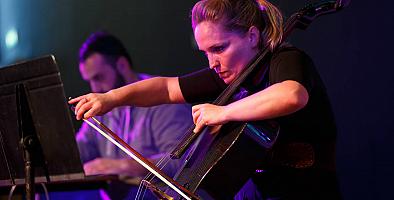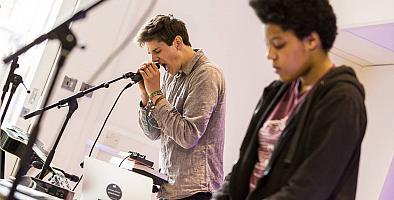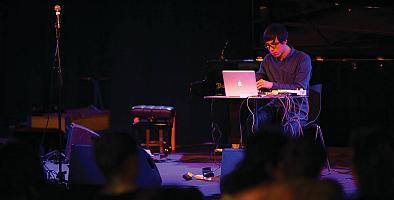BMus/BSc (Hons)
Electronic Music, Computing & Technology
Content navigation menu
Why study BMus/BSc Electronic Music, Computing & Technology at Goldsmiths
Imagine being able to create your own instruments, interactive installations or reactive sound design. This interdisciplinary degree gives you that opportunity.
- Alongside developing your own musical practice, you will learn to create custom software that can be used to further your artistic goals and to pioneer the future of electronic music.
- You'll learn electronic music composition, production and performance with software design and digital signal processing.
- You'll develop understanding across the broad fields of creative practice, computer science, and musical research. After your first year, you can choose to pursue a more technical or artistic path of study, leading to either a Bachelor of Music (BMus) or a Bachelor of Science (BSc) degree.
- The degree is designed to meet the opportunities, challenges and intellectual demands presented by careers in the arts and creative industries, in music technology and in audio, music and media-related computing.
- You'll study with a wide range of academics, including internationally established composers, performers, writers, and computing experts.
- Most importantly, you will be able to participate in, and benefit from, two of the most dynamic and exciting departments that Goldsmiths has to offer - Music and Computing.
Contact the department
If you have specific questions about the degree, contact Jenn Kirby or Eleonora Oreggia.
UCAS code
WG34
Entry requirements
A-level: BBB
BTEC: DDM
IB: 33 points overall with three HL subjects at 655
Length
3 years full-time, or 4 years full-time with the third year spent on a placement in a relevant industry or institution
Fees
Home - full-time: £9250
International - full-time: £20160
Departments
Music
Computing
Watch videos about this course
One degree, two pathways
The Electronic Music, Computing and Technology degree (EMCT) allows you to identify and develop your strengths and interests by choosing various specialist options in Goldsmiths' Music and Computing departments.
In your second year, you'll select from two possible pathways through the programme, which will determine the award of either BMus (Hons) or BSc (Hons).
Pathway 1: BMus – Music
- Music focus in module selection
- EMCT Music Final Project in Year 3
Pathway 2: BSc – Computing
- Computing focus in module selection
- Sound and Signal 2
- EMCT Computing Final Project in Year 3
What you'll study
Year 1 (credit level 4)
All students, in both pathways, study the fundamentals of electronic music, audio technology, computer programming, and music technology.
You will study the following compulsory modules:
| Module title | Credits |
|---|---|
| Introduction to Programming | 15 credits |
| Sound and Signal 1 | 15 credits |
| Contemporary Music Industries | 15 credits |
| Music Computing 1 | 30 credits |
| Live Performance Systems | 15 credits |
| Electronic Music Composition | 30 credits |
Note about optional modules (if available): The above is indicative of the typical modules offered, but is not intended to be construed or relied on as a definitive list of what might be available in any given year. The module content and availability is subject to change.
Industrial Placement Year
The degree includes an optional Industrial Placement Year between the second and third year of study. This offers you the invaluable opportunity to develop the practical skills and real world experience that is sought after by employers. You're supported throughout your placement year by a placement tutor, who provides you with guidance and liaises between you and your employer.
Teaching style
This programme is taught through a mixture of lectures, tutorials, workshops and laboratory sessions. You’ll also be expected to undertake a significant amount of independent study. This may include carrying out required and additional reading, preparing topics for discussion, and producing essays or project work.
How you'll be assessed
You’ll be assessed by a variety of methods, depending on your module choices. These may include coursework, lab assessments, group work and projects. If you opt for an industrial placement year, your placement tutor will assess your work. If you complete the placement year successfully, you earn the endorsement 'with work experience' on your degree certificate.
Entry requirements
We accept the following qualifications:
A-level: BBB
BTEC: DDM
International Baccalaureate: 33 points overall with three HL subjects at 655
UAL Extended Diploma: Merit overall
Access: Pass with 45 Level 3 credits including 30 Distinctions and a number of merits/passes in subject-specific modules
Scottish qualifications: BBBBC (Higher) or BBC (Advanced Higher)
European Baccalaureate: 75%
Irish Leaving Certificate: H2 H2 H2 H2
Additional requirements
An A-level (or equivalent) qualification in Music or Music Technology is preferred, although we also accept applicants without a formal qualification in music who can demonstrate relevant knowledge and experience.
You should also normally have at least Grade B/Grade 6 at GCSE Mathematics.
Admission is by interview and/or by submission of a portfolio. The portfolio should include two tracks of original music. These should demonstrate your music production and composition skills.
International qualifications
We also accept a wide range of international qualifications. Find out more about the qualifications we accept from around the world.
If English isn’t your first language, you will need an IELTS score (or equivalent English language qualification) of 6.0 with a 6.0 in writing and no element lower than 5.5 to study this programme. If you need assistance with your English language, we offer a range of courses that can help prepare you for degree-level study.
Alternative qualifications
See our full list of undergraduate entry qualifications.
Fees and funding
Annual tuition fees
These are the UG fees for students starting their programme in the 2024/2025 academic year.
- Home - full-time: £9250
- International - full-time: £20160
If your fees are not listed here, please check our undergraduate fees guidance or contact the Fees Office, who can also advise you about how to pay your fees.
It’s not currently possible for international students to study part-time if you require a Student Visa, however this is currently being reviewed and will be confirmed in the new year. Please read our visa guidance in the interim for more information. If you think you might be eligible to study part-time while being on another visa type, please contact our Admissions Team for more information.
If you are looking to pay your fees please see our guide to making a payment.
Funding opportunities
We offer a wide range of scholarships and bursaries, and our careers service can also offer advice on finding work during your studies. Find out more about funding your studies with us.
Additional costs
In addition to your tuition fees, you'll be responsible for any additional costs associated with your course, such as buying stationery and paying for photocopying. You can find out more about what you need to budget for on our study costs page.
There may also be specific additional costs associated with your programme. This can include things like paying for field trips or specialist materials for your assignments. Please check the programme specification for more information.
Facilities
Department of Music
The Music department has excellent rehearsal, performance and recording facilities including the Goldsmiths Music Studios and the highly specialised Electronic Music Studios.
Department of Computing
The Computing department has a wealth of specialist facilities and equipment for students to use, including the HatchLabs, a VR lab and the Sonics Immersive Media Lab.
Careers
Typical career paths
This degree is designed to meet the opportunities, challenges and intellectual demands presented by careers in the culture industries, in music technology and in audio, music and media-related computing.
Many of our graduates choose to work in fields related to their musical knowledge:
- Electronic music production
- Sound design
- Creative coding
- Audio development
- Audio product design
- Software developer
- Teaching
- Performing
- Creative work in media industries
- Publishing and retailing
- Record companies and production
- Arts administration
- Community musicianship
- Technical work in radio or television
You can read more about careers options after graduating on our Music skills and careers page.
Find out more about employability at Goldsmiths.
Skills
Our degrees aim to equip you with a wide range of skills to meet the current demands of industry and increase your career prospects.
This programme is designed with careers in music technology and music computing in mind.
It fosters the development of interdisciplinary understanding across the broad fields of:
- Computer science
- Creative practice
- Musical research





